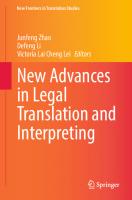New Frontiers in Theologyy II - The New Hermeneutic.
142 79 10MB
English Pages [266] Year 1963
Recommend Papers

- Author / Uploaded
- James McConkey Robinson
- John B. Cobb
File loading please wait...
Citation preview
NEW FRONTIERS IN' THEOLOGY Discussions amor^ Continental and American Theologians
\
?
r Edited by
James M. Robinson and John B. Cobb, Jr.
The New Hermeneutic A dialogue on a creative new departure in Christian thought, uniting Biblical interpretation with contemporary theology
$5.00
The second volume in a pioneering series
THE NEW HERMENEUTIC JAMES M. ROBINSON and JOHN B. COBB, Jr., Editors
This skillfully integrated volume presents a trans-Atlantic dialogue on a fundamental issue in contemporary theology. The debate centers around the radical and profound proposal to establish a new basis for systematic theology and a new link between re ligious thought and the humanities at large. The key to this proposal lies in a new appreciation and reappraisal of hermeneutics—the science of interpret ing Scripture. The distinguished German scholars, Gerhard Ebeling and Ernst Fuchs, take a major stride forward in their “focal
(Continued on back flap)
C(T8£s
0^
NEW FRONTIERS IN THEOLOGY Discussions among Continental and American Theologians
Volume II
The New Hermeneutic Edited by James M. Robinson • John B. Cobb, Jr. Southern California School of Theology at Claremont
HARPER & ROW, PUBLISHERS New York, Evanston, and London
Grateful acknowledgment is made to Fortress Press for permis sion to reprint “Word of God and Hermeneutic” from Word and Faith by Gerhard Ebeling, translated by James W. Leitch.
Copyright © 1964 by James M. Robinson. Printed in the United States of America. All rights reserved. No part of this book may be used or reproduced in any manner whatsoever without written per mission except in the case of brief quotations embodied in critical articles and reviews. For information address Harper & Row, Publishers, Incorporated, 49 East 33rd Street, New York 16, N.Y. THE NEW hermeneutic.
LIBRARY OF CONGRESS CATALOG CARD NUMBER:
64-14380
CONTENTS vii
Foreword to the Series
ix
Editors’ Preface I. The Issue i. Hermeneutic Since Barth
James M. Robinson
1
FOCAL ESSAYS
2. Word of God and Hermeneutic Gerhard Ebeling 3. The New Testament and the Hermeneutical Problem Ernst Fuchs
78
111
II. American Discussion 4. On Broadening the New Hermeneutic John Dillenberger 147 5. The Hermeneutical Problem and Historical Criticism Robert W. Funk 164 6. The Word as Address and the Word as Meaning Amos N. Wilder 198 III. Reappraisal and Response 7. Faith and Culture John B. Cobb, Jr. 8. Response to the American Discussion Ernst Fuchs
219 232
NEW
FRONTIERS
IN THEOLOGY
I. The Later Heidegger
and
Theology
Contributors: Heinrich Ott Arnold B. Come Carl Michalson Schubert M. Ogden
IL The New Hermeneutic
Contributors: Gerhard Ebeling Ernst Fuchs John Dillenberger Robert W. Funk Amos N. Wilder
III. Theology as History (in preparation)
Contributors: Wolfhart Pannenberg William Hamilton Kendrick Grobel Martin J. Buss
Foreword to the Series Continental, and especially German, theology has played a lead ing role in the creative theological thinking of modem times. American theology has shown a characteristic openness to hear ing, adapting, and assimilating the significant movements of European theology. As long as this relationship was characterized by a considerable time lag in the translation and introduction in America of theo logical trends from the Continent, the American role was of necessity often that of receiving the results of a largely terminated discussion, so that the ensuing American discussion could hardly affect the ongoing discussion abroad. In recent years the greatly increased number of personal contacts among Continental and American theologians, and the steady flow of translations, indi cate the possibility of a more direct interaction. This series of “discussions among Continental and American theologians” is intended to provide a means for such a theological interaction. Rather than translating the finished systems of mature scholars, it proposes to identify future trends at the germinal stage of programmatic essays, and by means of critical discussion to share constructively in their development. Accordingly, each volume will present in translation such a programmatic essay—in the present volume, two such essays—introduced by Professor Robinson with an analysis of the situation in which it emerged and in terms of which it has its significance. This will be followed by constructive and critical contributions to the issue by Ameri can theologians of promise. Finally, reappraisals of the issue in the light of these American contributions will be presented both by Professor Cobb and by the author of the essay under analysis.
vii
Editors3 Preface The decisions with regard to translational policy discussed in the Preface to Volume I of this Series apply to Volume II as well. That is to say, the equation of existenziell and existenzial with “existential” and “existentialist” respectively, of das Sein and das Seiende with “being” and “beings” respectively, and of geschichtlich and historisch with “historic” and “historical” respec tively, has been carried through to the extent that these terms occur. For the present volume one further decision as to trans lational policy is of sufficient prominence that its background should be sketched. The German term Hermeneutik, like the terms Logik, Ethik, Asthetik, and Dogmatik, is singular in number. Indeed Heidegger has come to the defense ófTfiis use^oTthe singular in the case of logic, ethics, and aesthetics by construing them as Greek ad jectives modifying the unexpressed noun epistěmě, knowledge {Nietzsche, I, 1961, 92). Ebeling has applied this argument to the term dogmatics, which derives from the singular adjective in Protestant orthodoxy’s term theologia dogmatica {Theologie und Verkundigung, 1962, pp. 105-109). Plato refers (Politicus 260D) to (A





![Linear Programming - New Frontiers in Theory and Applications : New Frontiers in Theory and Applications [1 ed.]
9781624173615, 9781612095790](https://ebin.pub/img/200x200/linear-programming-new-frontiers-in-theory-and-applications-new-frontiers-in-theory-and-applications-1nbsped-9781624173615-9781612095790.jpg)



